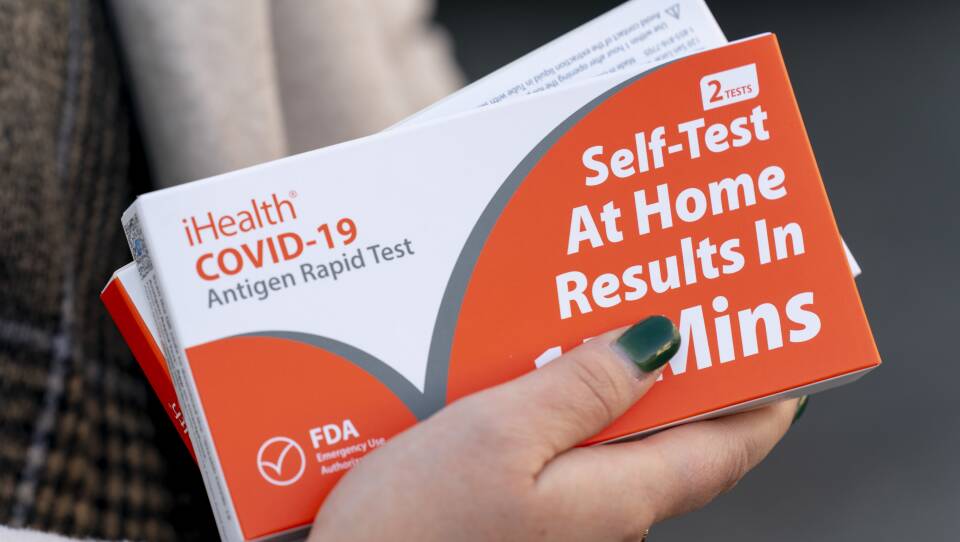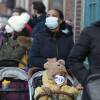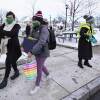Last week, GBH reported there’s no formal route for Massachusetts residents to report to the state their results from rapid coronavirus tests taken at home.
Residents and public health workers are frustrated by the barriers to report results from home rapid tests, and count those numbers in a tangible way so the public has a greater understanding of the pandemic in their communities. Some towns have launched their own forms for collecting at-home test results. Meanwhile, there's no indication the state has plans to record those cases.
“Most at-home tests are not reportable to public health authorities,” a spokesperson for the Department of Public Health said. The exceptions are tests administered and observed during telehealth visits and tests that involve samples collected at home then mailed into a laboratory. The agency recommends people who test positive using at-home tests isolate and notify their close contacts.
The agency said individuals who test positive can enable MassNotify , a free service developed by Apple and Google, which allows users to anonymously report their COVID-19 cases. The tool doesn’t send information about rapid test results to public health authorities.
People want to know what the protocol is, and if they can find a way to self-report their rapid test positives.
More Local News
On Jan. 2, John LaVoie felt sick and took a rapid test at his Newton home. He was worried after he tested positive, knowing that the result meant he exposed his wife and three young kids to the coronavirus. LaVoie and his wife alerted their childrens' pediatrician about the exposure but were told to wait until the kids had symptoms to get a PCR test. They decided they wanted to report LaVoie’s positive result from the rapid test, but weren’t sure how, so they called their public health department.
‘“They said, 'All right, thanks for telling us, you should isolate' and no additional information. It was a little disconcerting. ... There must be so many more people positive that are not being counted in the official numbers," he said.
LaVoie's doctor told him not to bother getting a PCR test, but if his oxygen level plummeted, to go to an emergency room. “They basically wanted nothing to do with me,” he said.
LaVoie said he’s uncomfortable with the ambiguity of reported numbers as a parent. “We make decisions about what activities you want to do and what level of exposure they might be willing to risk based on the number of cases that are actually out there in the community,” he said. “And although the PCR ones are probably some percentage of it, it's not the real number.”
"If we're giving people the ability to test at home, we should be giving people the ability to report from home."- Eliza Mulcahy
In Dorchester, Eliza Mulcahy tested positive at home, and wanted to have it documented when she felt well enough.
“I contacted my doctor to check in with them. Then I tried to figure out how Massachusetts wanted us to report, and there was no answer,” said Mulcahy, who searched online, asked friends, and checked both the state and local public health websites.
Boston’s Public Health Commission said it urges residents who test positive using rapid tests to self-isolate and to "notify their close contacts and encourage them to get tested as well, given their possible exposure.” The commission did not reply to an inquiry on whether it will start collecting rapid test data.
Mulcahy attempted to report her result through MassNotify, thinking it would send her positive test result to the Department of Public Health, but she found the process too complicated and gave up. She was surprised to hear that even if she had succeeded in reporting through the service, the information wouldn’t have been shared with the state.
“If we’re giving people the ability to test at home, we should be giving people the ability to report from home,” she said.
Andrew Lover is an assistant professor of epidemiology at UMass Amherst’s School of Public Health and Health Sciences, and he acknowledged there’s an undercount of positive cases going on.
“I think the big challenge is that many local and state departments of health are, you know, really understaffed and overwhelmed right now with pandemic response — and certainly having a huge number of new tests reported just adds to that burden.” The data would be useful, but he thinks it’s a capacity issue.
Zoë McLaren, an associate professor at the University of Maryland Baltimore County’s School of Public Policy, said people may not have the incentive to report results even when it is feasible. "So if you have a positive test, you may not want everyone to know. You may not want contact tracers to know. You may not want that as a record. You may not want that information to be made available to anybody else.” She still thinks there’s should be a national website to report a positive test for people in states that don’t collect.
“I think there’s a lot of room for very simple solutions,” McLaren said. She added that data collectors have to take into account who might report, what information gets captured and where it goes.
North Attleboro’s Health Department is giving their locals that option. Last week, they launched a voluntary online form for residents who test positive at home.
“From discussion with staff and nurses, we wanted to have a mechanism that we could capture some of that information if people chose to share that,” said AnneMarie Fleming, the town's health director.
In the lead up to the decision, North Attleboro parents were calling schools to report when their kids had a case of COVID-19, then would call the Board of Health. So the IT department came up with a webpage and a simple spreadsheet to collect contact information, the number of people who tested positive, and other basic details. Fleming said a dozen people have reported positive cases through the form since Tuesday.
On Facebook , Winthrop’s Town Manager office shared a link to a Microsoft Office form where residents can self-report any positive results from home test kits.
“We were unable to keep up with the phone calls of people calling with clarification and guidance,” said Meredith Hurley, director of the Department of Public Health and Clinical Services.
She said the town wanted to keep people’s electronic medical records updated, even if they test positive at home. It’s also helping the Board of Health track reinfections among people who get COVID-19 more than once. They’ve had 44 people report rapid test positives in the week since the form launched.
"We're only good as the data that we have. We're losing data that could be very useful for lessons going forward in this pandemic."- Meredith Hurley, director of Winthrop's Department of Public Health and Clinical Services
Hurley thinks the state should also collect rapid test data.
“I just don't know how they would do it. That's the barrier,” she said. Data collection can strain already hampered health systems, but at the same time, having a broader view of infections in the community could help.
“We're only good as the data that we have. We're losing data that could be very useful for lessons going forward in this pandemic,” she said.
In North Attleboro, Fleming thinks the reason why the state isn’t collecting rapid test data is because of its quality. “It’s that issue that they [the state] don’t feel that it’s data they can collect that has any type of integrity, that we can say this was done by a health professional.”
Other states and municipalities are asking people to voluntarily submit their positive rapid test data on new websites.
Over 63,400 people have self-reported to Washington, D.C.’s system since October, with more than 7,500 of them being positive results. D.C. includes that information on a spreadsheet posted daily to its count site, and considers it probable case data. The voluntarily reported data has a disclaimer: “Probable cases can be used in conjunction with confirmed cases to track disease spread but will be reported separately from confirmed cases to be consistent with CDC definitions. Probable case data is NOT reflected in other DC Health metrics, to include case counts, as data is self-reported and cannot be verified.”

Colorado’s rapid test reporting system launched in September, with 5,445 individuals reporting positive results at home. The state bolstered its marketing of the effort recently, so 4,179 of those happened in the last month.
“We encourage all individuals who test positive using at-home tests to report their results,” the Colorado State Joint Information Center told GBH in a message. “When individuals report their positive results, they are entered in our surveillance system with other cases for investigation. We want individuals to report their positive Rapid At-Home results because it helps us obtain important information about possible close contacts and provide important information about possible treatment options and guidance for isolation and quarantine.”
The state gives out a lot of free tests manufactured by Abbott, including the Binax over-the-counter test, and said people who get tests from other companies can also submit their results. Those positive cases are classified as “suspect cases” by the state, and aren’t included in our daily case counts, which only include confirmed and probable cases. But they are being tracked.
The state of Massachusetts does have a new opportunity for rapid test data collection. Gov. Charlie Baker announced Tuesday his administration secured 26 million rapid tests through iHealth Labs for educators, students and the childcare system. iHealth antigen rapid tests are one of several that allow users to report their negative or positive results to the company, which can subsequently share that anonymized information with the state. iHealth didn’t return GBH’s request for an interview, but another rapid test company that collects this data from users did.

In December, the Baker administration ordered 4,640 boxes of On/Go rapid test kits from Intrivo, each containing two tests, for $88,160 total.
Ron Gutman is co-CEO of Intrivo, and said his test actually allows people to upload a picture of their result, dubbed the “tap, swab, snap.”
Users start the app, swab their nostril, and take a quick picture of the test cassette with a phone camera. The On/Go app generates a secure testing badge that can be shared or used to gain access to businesses.
“This is really anonymized data that will go to really figure out outbreaks,” he said. Because the data is protected and anonymized, Gutman said he’s happy to share it to any public health entity to track cases.
“We’re working with states right now and we're happy to work with the state of Massachusetts together to make this thing happen,” he said.



![Gov. Charlie Baker took questions from COVID-19 and Emergency Preparedness and Management Committee chairs Sen. Jo Comerford and Rep. Bill Driscoll during a virtual oversight hearing Tuesday. [Screenshot from State House News Service]](https://cdn.grove.wgbh.org/dims4/default/03b359e/2147483647/strip/true/crop/502x502+249+0/resize/100x100!/quality/70/?url=https%3A%2F%2Fk1-prod-gbh.s3.us-east-2.amazonaws.com%2Fbrightspot%2F64%2Fe0%2F27ec0c5ba8acf3a1501677e4e784%2F01-11-covid-hearing.jpg)





